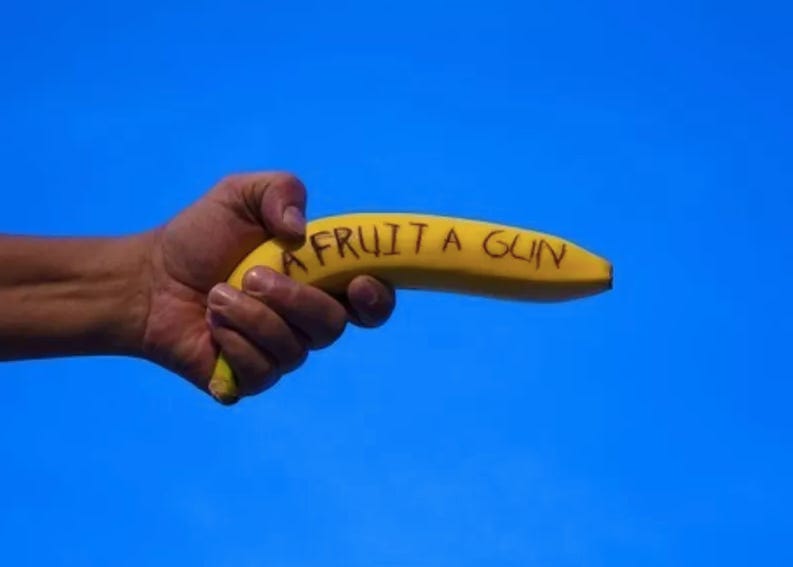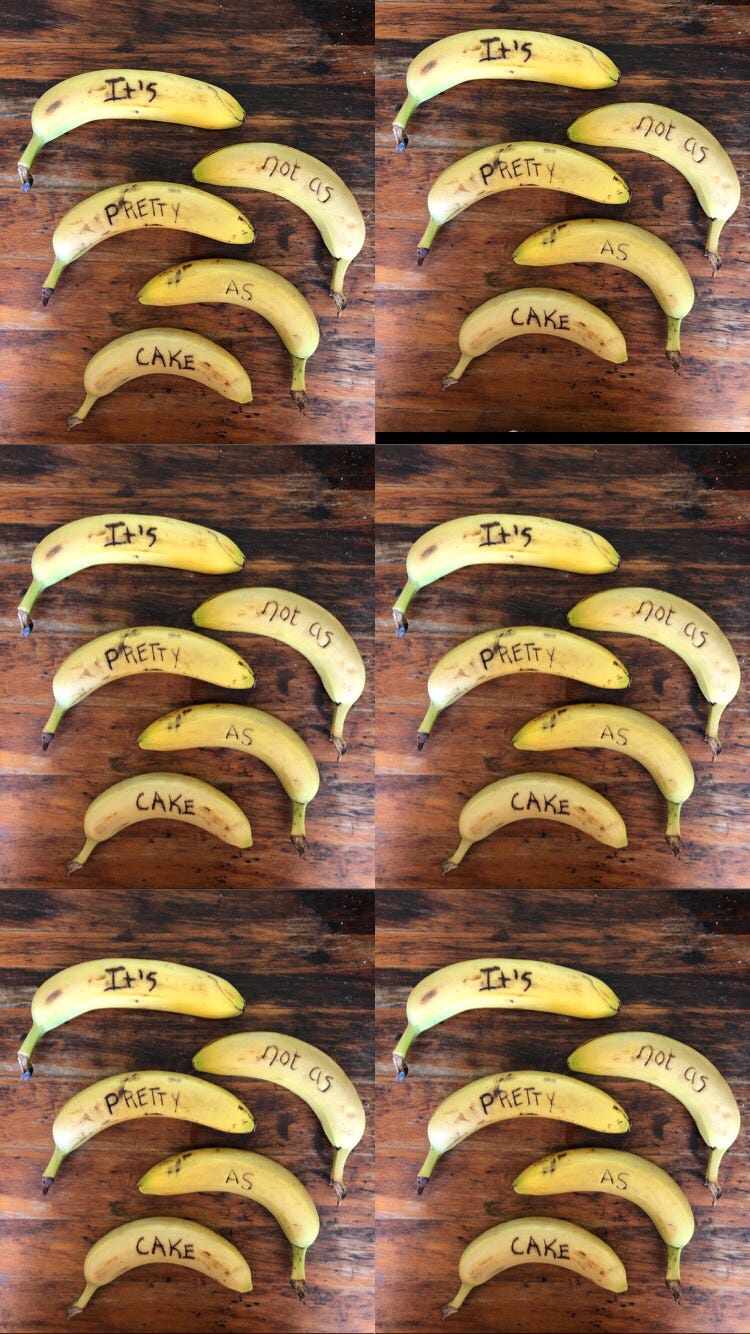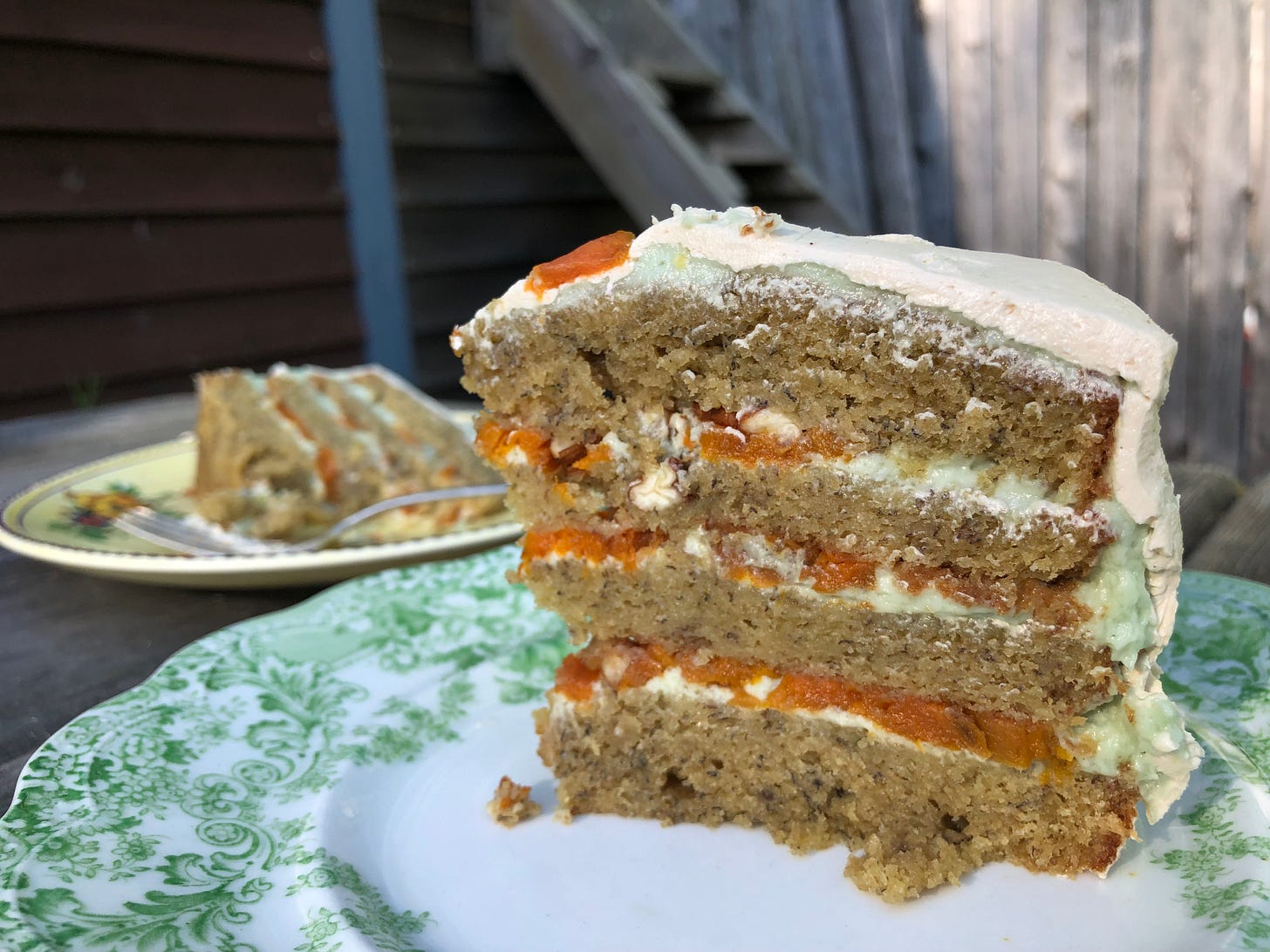
Why bananas:
Because this is personal. Every banana I’ve eaten in my 50+ years is a fruit that embodies multiple narratives. Just like any other food. But bananas, specifically the bananas grown in Latin America bound for export to the U.S., are exceptional. Because their narratives, the ones that influenced my reality, were masterfully constructed by Edward L. Bernays (1891-1995) “the father of public relations” to veil one American company’s imperialistic-consumer-capitalism gone unchecked, all while getting the public (like me) to eat more and more bananas, with no regard to the human, environmental and political costs to their Latin America countries of origin, aka the United Fruit Company’s - “Banana Land” (UFCO is now Chiquita Brands International).
I grew up a Bernays’ milieu, this conjurer and creator of public perceptions. It’s because of his p.r. campaigns for companies and industry lobby groups that down the line, I dutifully carved Ivory soap sculptures in grade school (Proctor & Gamble), sang + danced like the half woman/half fruit Chiquita Banana mascot (UFCO/Chiquita), had bacon for breakfast (pork lobby + health professionals), begged my mom for Twinkies and Wonder Bread (Ward Baking Company) and smoked cigarettes thinking it badassery (American Tobacco Company). I ate cheap bananas year round as a healthy snack, in ice cream sundaes, at all-you-can-eat VFW pancake breakfasts and in baked goods. When they got too bruised or overripe for my liking, I cavalierly tossed them aside.
This is just an inkling of Bernays’ clandestine trails of bread crumbs that’s arguably, shaped my generation. Though after his death in 1995, his papers became public. The Library of Congress houses 160.2 linear feet’s worth. His client list alone reveals more about me than I’d care to admit, from the mastery of his manipulations.
Edward L. Bernays’ sphere of influence isn’t relegated to catchy jingles and sliced bananas on cereal. Or my belly, my perceptions. His social theories and case studies are ingrained. They are imitated and inform, rippling out through time, professions and place today. Public relations, advertising + marketing, and issues management are integral to contemporary business strategies for increasing revenue + economic growth, managing public perceptions, and to politicians’ policies, playbooks + coffers.
Bernays, Sigmund Freud’s nephew, was like no other in deploying group psychology manipulation/warfare and ‘the engineering of consent’, “which he understood to mean the influencing of people’s opinion and therefore their behavior.” (citation) Seductive and foreboding narratives (here and abroad), prodigious planning, responsiveness and iterations - was an integrated multi-dimensional strategy combined with an unusual knack for reading the masses. In total, all of this contributed to a thoroughness of his p.r. campaigns which were engineered to profit only his clients.
Though his true legacy in my opinion, is far more vast. It’s the encompassing societal and economic ripple effects of what’s left behind in the wake of those seeming ‘cultural trends’ that his particular genius for p.r. set into motion. With no regard to the outcomes for societies at large.
Hired in 1941 as a consultant, UFCO was just one of Bernays’ clients. Under Sam Zemurray’s leadership at that point in UFCO’s reign, it was an established, highly extractive, imperialistic and vertically integrated supply chain. UFCO was formed in 1899 and by the 1920s the Boston-based UFCO’s empire included Latin America, Jamaica, Cuba, the Dominican Republic, parts of Colombia and Ecuador and reached across to Europe with its ‘Great White Fleet’ - the largest private navy replete with refrigeration. (Financial Times, Rotten Fruit, retrieved 6/8/22)
Over multiple years, Bernays at the employ of Zemurray, used multiple platforms like trusted news sources (radio, newspapers, television) the arts, the grocery industry, the public health sector, advertising, and cookbooks, that in sum captured and manipulated the American public’s imagination. By the ‘50s he also piqued Cold War fears. Bernays intertwined many parallel forces, if you will, including consumer desire for bananas while manufacturing a threatening political storyline: the supposed communist threat in Latin America, specifically Guatemala (one of UFCO’s countries), which was too close for comfort to our American shores.
“This whole matter of effective counter-Communist propaganda is not one of improvising,” Bernays noted in a 1952 memo to United Fruit’s publicity chief. “What is needed,” he added, is “the same type of scientific approach that is applied, let us say, to a problem of fighting a certain plant disease.” ~ Larry Tye, Watch Out for the Top Banana.
The stage was being set for the CIA’s covert operation to overthrow the democratically elected government led by president Jacobo Arbenz in the 1954 coup d'état that installed U.S.’s choice, Castillo Armas as president.
PBSUCCESS, authorized by President Eisenhower in August 1953, carried a $2.7 million budget for "psychological warfare and political action" and "subversion," among the other components of a small paramilitary war.
~ The National Security Archives, CIA and Assassinations: The Guatemala 1954 Documents retrieved 6/8/22
It is no coincidence that in the Eisenhower administration, two top advisors were former UFCO executives and brothers. John Foster Dulles was the secretary of state and Allen Dulles was the head of the CIA. Both helped orchestrate the 1954 Guatemalan coup d'état. (citation)
This was culmination of UFCO’s desired outcome with Bernays’ consultancy. Democracy is in many ways, antithetical to capitalism and big business because democracies are volatile and vulnerable to things like the will of the people. And they guarantee other things like free and open elections, voter protection, free speech, protective labor laws, allow unions and land reform, and then there’s leadership turnover. Dictators and communism on the other hand, offer far more stability for multi-national business interests.
In Guatemala, UFCO wanted that stability, favorable tax rates and land. After the coup, an estimated 234,000 uncultivated acres that had been expropriated for Guatemalans from UFCO under the Agrarian Reform Law (Decree 900 was passed in 1952) - those acres were taken back for UFCO by the U.S.-installed president Castillo Armas.
Zemurray/UFCO took what they came for and up north, we kept on eating bananas.
Forty years of civil war ensued after the coup, including the genocide of Maya peoples. “Although Arbenz and his top aides were able to flee the country, after the CIA installed Castillo Armas in power, hundreds of Guatemalans were rounded up and killed. Between 1954 and 1990, human rights groups estimate, the repressive operatives of successive military regimes murdered more than 100,000 civilians.” (citation here)
For a timeline of UFCO in Latin America go here.
Listen to Harvard Business School professor Geoffrey Jones on the U.S. backed overthrow of president Jacobo Arbenz of Guatemala in 1954 and the lasting impact and role of UFCO in Guatemala.
The violence of UFCO’s banana business in Latin America echoes generationally today and cannot be underestimated because it is defining. From the slave-culture of plantations, on laborers (indigenous and migrant), genocide, disappearances, civil unrest, coups, environmental damage - all of this informs American perception of these countries though it’s largely been issues managed in terms of the public purview.
Arguably, Bernays’ lasting influence and legacy in the world, which includes the bananas’ value chain, cannot prone to hyperbole. In his words:
The conscious and intelligent manipulation of the organized habits and opinions of the masses is an important element in democratic society. Those who manipulate this unseen mechanism of society constitute an invisible government which is the true ruling power of our country. We are governed, our minds are molded, our tastes formed, and our ideas suggested, largely by men we have never heard of…. It is they who pull the wires that control the public mind.
~ Edward L. Bernays, ‘Propaganda’ 1928: retrieved from The Conversation, 6/6/22
So taking it back to the personal: To be clear, Bernays didn’t pry open my mouth and make me eat bananas. But he did create the dominant + durable narratives of desire, driving forces of consumerism, that I grew up in.
And so now with more information, my perspective shifts. I’m critically examining and reflecting upon the conscious and unconscious biases that I hold about Latin Americans, these countries, and food from ‘away’ - given my history + what I’m learning about bananas. How have the narratives that I grew up on, impacted my thoughts, thinking and my behavior? More to the point: What am I going to do in response to them, now?
“Bernays understood it’s not what is happening, it’s the story you tell about what is happening. That is the reality…” Geoffrey Jones, Harvard Business School, from the movie When Banana Ruled

Because Jean-François Boclé and cooking as performance art. Jean-François Boclé is a Paris-based artist from Martinique. His work includes bananas as muse, medium, protagonist and the star ingredient of jam. One of Boclé installation’s includes cooking with the bananas he’s written on and then offering the food to onlookers:
The skins of the bananas that Boclé uses to make the jam have been annotated with a series of phrases taken from popular sayings or street conversations in different languages of the Americas and Caribbean such as Spanish, Creole, French and English. “La sangre de la banana nunca se quita” (banana blood can never be wiped away), “A fruit, a gun” or “L’exotisme de la violence” (The exoticism of violence) are some of the phrases that appear on the fruit. During the action the artist takes each banana, reads the phrase aloud and then peels the skin off and launches it into the audience before chopping the fruit on a board and throwing it into a pot to simmer away. Once the jam is ready it is given out to the audience for free. When the performance is held in Colombia, the jam that is left over is kept and a second act is performed that consists of re-enacting the first scene, but instead of making the jam this is distributed in a tasting session, accompanied by a notice that reads, “Free Martinican jam”. The reception to this was surprising as even though the product was being given away for free, the passers-by didn’t want to take any or try it.
Excerpt from Banana Craze retrieved 6/6/22
Because Banana Craze. Two visionary women, Juanita Solano Roa and Blanca Serrano Ortiz de Solórzano, developed this Spanish + English digital humanities project, “A virtual exhibition about how the banana has shaped identities, ecosystems and violence in Latin America.” There’s a rich database of resources, commentaries and events that supports this project.
All these roads I’m taking, trace back to Banana Craze.
“Banana Craze is the first major study of how a natural resource such as the banana has shaped the past and the present of a continent, and how this phenomena finds expression through culture. Banana Craze brings together almost 100 pieces of contemporary Latin American artists in which the banana is the main feature.”
Because food systems. The Canadian-based Equifruit sponsors some of Banana Craze’s events and it’s got me curious about how an importer/marketer of Fairtrade bananas can disrupt and reimagine this generations-old, historically violent value chain, in terms of human costs, laborers’ rights, and the environment. I look forward following up with this women-led company. (And how is it I can buy organic fair trade Equal Exchange bananas, in southern Vermont, five for $1.49?)
Because I bake cake. Planning Banana Cake #1 kept me up at night. This cake is made up of banana sponges, with an artificial banana flavored buttercream that I colored blue for between the layers, with some roasted sweet potatoes and pecans. The crumb coat is also the blue buttercream and a maple buttercream frosts the entire cake.
I flavored that blue buttercream with banana extract because according to legend it’s apparently formulated using chemical components of the Gros Michel.* You know that taste of banana taffy, runts candy, convenience store banana muffins? That flavoring extract is supposedly the flavor profile of the Gros Michel which no longer exists in the mass market supply chain today. Bananas are an intensive monocrop, highly susceptible to fungal diseases so despite all the pesticides in the world, by the late 1950s the Gros Michel succumbed to disease and was replaced by the Cavendish, what we eat and taste today. (Which apparently is also on the way out. History repeats itself.)
I made the banana flavored buttercream blue - in acknowledgment of the banana plantation laborers nicknamed The Parakeets and The Poisonous (The Venenerous) who, enticed by higher pay, volunteered under Sam Zemurray’s watch (UFCO) to apply copious amounts of noxious pesticides on the crop, knowing that it’d would turn their skin a toxic shade of blue.
So I used the blue banana flavored buttercream as an undercoat and between the banana cake layers because if you don’t know about things like pesticide use, damage to the environment, the inhumane conditions and poor pay laborers were subject to, history, the lack of accountability, generational harm and how it informs today - can you taste them?
Because #birthdaycakesforpeace. My Instagram-based, online virtual fundraiser, is currently for Everytown which works to end gun violence and pass sensible gun safety laws. #birthdaycakesforpeace is like another kind of performance art and a practice, an intention; baking for suffering and joy because we are all interconnected. Every birthday cake I post includes something like this:
This #birthdaycakesforpeace is for anyone + everyone who wants or needs a virtual slice of birthday cake today + it comes with this message:
I baked this cake for you, with presence not perfection.
I’m so glad you were born, whoever you are.
I’m so glad we are here, wherever you are.
Make a wish. Peace.

Because bananas are not the only fruit.** They are among the likes of coffee, sugar, and chocolate - these outsourced, highly extractive agricultural products that Americans consume every day. We eat around 30 lbs. of bananas per person per year. (N.B.: there’s a tons to unpack here another time with regards to differences between conventionally grown, organic, labor and fair trade.) So what is like to cook with bananas as I’m learning more of their stories? Whose stories am I consuming, cooking and sharing? What is it we taste, or don’t want to taste about them? (See the aforementioned blue banana flavored buttercream.)
More banana cakes and baked banana things from my kitchen are to come.
“Cakes are made of hopes and habits, thoughts and prayers, dreams and disasters. This cake comes to you hot off the mystic press, struggling voraciously to hoist you higher than your midday estimations. This cake will lift you as the sun does each morning, inviting you beyond every day struggles, the personal ones, as well as the broad social ones that can't stop knocking on our doors. Please wear my cloak of cake as if you were my loved ones, because you are, and carry our best wishes for the world into each mouthful.” ~ Amy Halloran’s newsletter Dear Bread Bike Fest: Cake Auction 6/5/22

Because bananas are as American as apple pie. This tropical fruit is a significant part of the American diet because of an American company, American capitalism, violence, conventionally extractive and highly damaging agricultural practices, U.S. politics, foreign policy and profit, all at the expense of people and other countries. Americans eat more bananas than apples and oranges combined, around 10 billion of them per year. They’re cheap and we think we’re not paying for the hidden costs - which are also characteristics of our food choices and our food system.
The idea that something has to be grown on American soil to be American is convenient for us and in my opinion, enables Othering.
“Othering” is a term that not only encompasses the many expressions of prejudice on the basis of group identities, but we argue that it provides a clarifying frame that reveals a set of common processes and conditions that propagate group-based inequality and marginality. ~ The Problem of Othering: Towards Inclusiveness and Belonging retrieved 6/9/22.
Bananas in the U.S. are also a ‘melting pot’ story. The fruit’s multi-national supply chain was built up by the likes of ‘bootstrapping’ immigrants from Russia to Alabama and then New Orleans (Zummary migrated in 1887) and from Austria to New York (Bernays’ family migrated in 1890s).
UFCO was formed in Boston, played puppeteer to U.S. administrations, was paternalistic towards Latin American peoples and with hostility overturned their governments for its continued pursuit of imperialism and colonist capitalism. On the ground, Ivy League managers and foremen from the U.S. South were enjoined by UFCO to advance slave culture perpetuated on their banana plantations and forbade unionization (citation: When Banana Ruled).
What could be more American than all this? Maybe the old wink-wink-nod-nod, “Sometimes a banana is just a banana.”
I imagine Bernays’ spirit, still behind the curtain, looking on in some kind of wonderment, from wherever he is.
Bananas’ stories were designed so I wouldn’t know them. So these days, me and the banana, we’re learning to dance together in my kitchen to all manner of truths, joys + sorrows, flavors + songs that I haven’t heard before. Nor had I honestly cared enough or thought to listen.
Until next time, thanks for reading. I’m so glad we’re here.
~ ali
* Nadia Bernstein writes all about flavor, flavor science, flavor industry “and the ways that flavor additives have shaped the history of food and our own appetites and palates.” I think she’s brilliant: “In a certain manner of speaking we are always denied our full measure of experience, because perception is always selective; the sensations we attend to, and the meanings we attach to them, are shaped by our histories and the contexts in which we live.” ~ excerpt from Bananas!
**A riff off the title of Jeanette Winterson’s book, Oranges are Not the Only Fruit.

